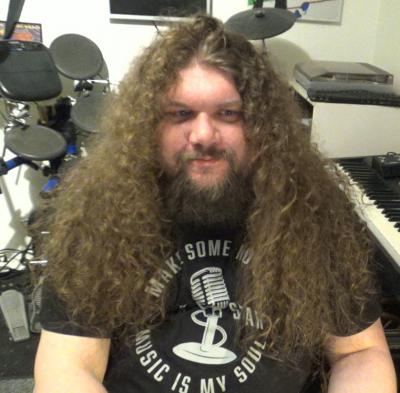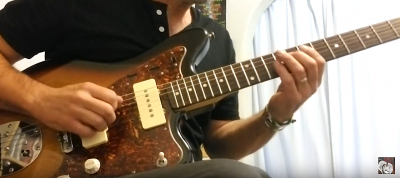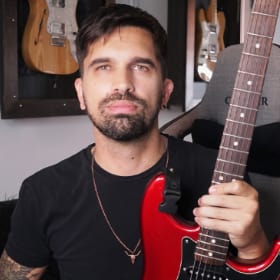Slow Down, Advice from Troy Stetina |
|
|
|
|
|
| Sep 28 2013, 03:59 PM |
|
Speed is a by-product of accuracy.
-------------------- - Ken Lasaine
https://soundcloud.com/klasaine2/foolin-the-clouds https://soundcloud.com/klasaine2/surfin-at-the-country-hop Soundcloud assorted ... https://soundcloud.com/klasaine3 New record ... http://www.cdbaby.com/cd/kenlasaine Solo Guitar ... https://www.youtube.com/playlist?list=PLXZh...5iIdO2tpgtj25Ke Stuff I'm on ... https://www.youtube.com/playlist?list=PLXZh...b-dhb-4B0KgRY-d |
|
|
||
|
|
|
|
| Sep 29 2013, 03:01 AM |
|
I have given this advice to my students for years. If you can play a passage or entire tune slowly and smoothly with proper detail then you will find yourself able to play it at any speed you wish.
This is the theory behind the defensive martial art of Tai Chi Chuan. The blocking moves are practiced very slowly with attention to precise form and detail. If one has also studied the application of those moves, should one be attacked the attacking moves can be countered at lightning speed and the more fierce the attack the more the attacker finds himself being injured by purely defensive moves. Years ago I played with a drummer who had mastered this martial art and he was invincible when attacked. -------------------- Mike
"The business ain't nothin' but the blues!" - Rahsaan Roland Kirk Inductee in the Blues Hall of Fame, March 14, 2012. Mike-Wilhelm.com YouTube: Michael Ray Wilhelm, Blusician, guitar & vocal |
|
|
||
|
|
|
|
| Sep 29 2013, 09:03 PM |
|
Once you've 'got it' then yeah, it's great to bump it up way faster than you'll probably ever play it.
-------------------- - Ken Lasaine
https://soundcloud.com/klasaine2/foolin-the-clouds https://soundcloud.com/klasaine2/surfin-at-the-country-hop Soundcloud assorted ... https://soundcloud.com/klasaine3 New record ... http://www.cdbaby.com/cd/kenlasaine Solo Guitar ... https://www.youtube.com/playlist?list=PLXZh...5iIdO2tpgtj25Ke Stuff I'm on ... https://www.youtube.com/playlist?list=PLXZh...b-dhb-4B0KgRY-d |
|
|
||
|
|
|
|
| Sep 29 2013, 09:36 PM |
|
That book is like my bible, I always repeat the part that you posted here. However I also agree with Petrucci's method. Sometimes going a bit faster can make your limit more comfortable.
I also remember that John Petrucci suggestend in his "Rock Discipline" video to sometimes try and play the licks you are practicing at higher speeds, and then come down to your original tempo, and it will be easier there. -------------------- My lessons
Do you need a Guitar Plan? Join Gab's Army Check my band:Cirse Check my soundcloud:Soundcloud Please subscribe to my:Youtube Channel |
|
|
||
|
|
|
|
| Sep 30 2013, 08:25 AM |
|
I agree with the practice slowly etc and Ben's idea of speed bursts.
I've found that initially going at some kind of speed can be helpful as I've often practiced something slowly and increased and then at a certain point found my fingering isn't possible at faster tempos so have to change it and start again! -------------------- My SoundCloud
Gear Tyler Burning Water 2K Burny RLG90 with BK Emeralds Fender US Tele with BK Piledrivers Epiphone 335 with Suhr Thornbuckers PRS SE Custom 24-08 Ax8 Fessenden SD10 PSG Quilter TT15 |
|
|
||
|
|
|
|
|
Sep 30 2013, 09:19 PM
|
|
Very interesting i'll have to try that. I'm slightly at a loss with how to approach things right now, because although practicing things slow can clean things up, it doesn't really help me with speed building. This is more the case with extremely difficult things. I've increased tempos gradually, and also in larger steps (10+bpm), tried to keep small motions etc, yet i generally always feel too rushed and hurried at the target speed. This may be because i'm increasing things too soon, and getting impatient, not sure. So lately, i've been playing things slow to get the part learned, and to get the accuracy and muscle memory initially prepped, then' dipping my toes in the water' at a much higher/target speed, to see if i'm going to have any problems, then coming back down in speed, making and maintaining necessary adjustments at the slower speed. For instance at real slow speeds (depending on what you're doing) you may accidentally pick everything, because it feels natural at that speed to do so, but at the target tempo there just simply may not be enough time for that, you may have to change something small, like add a pull off,hammer on, or sweep, or change the fingering in order to execute it at top tempo. I'm not sure if this is working yet, but it feels a little better so far. The other thing i'm struggling with is that at a slower speed you're thinking of each individual note as a separate entity, because you have time to. If you need to increase speed, you reach a certain point where this thinking has to change and you have to approach the whole phrase as one entity (to see it as a whole sentance rather than individual letters or words). Finding that gear shift, making adjustments, and also knowing when to make that push is the thing that i find quite difficult to balance. So overall, i'm now starting to think that just applying a blanket approach of 'play it slow' isn't something that's going to work for everything. Each problem may need a different strategy, finding out what that is, based on my individual problems is what i'm trying to figure out! This is very interesting. Yes I've also found that you can't think of every note at a certain speed, or you can, but it's just not effective. The concept I was referring to is called Chord Attack and it basically goes like this. I first do several Chord Attacks then I do slow to fast practice. (Very simplified.) And as you can see the motion required is much greater when doing slow to fast than fast to slow(it's also closer to a "good hand posture"). Chord Attacks Piano Fundamentals It ofcourse can be applied to two note sections or three or five or whatever you want. I've tried using it on guitar to minimize movements and it works quite well. It's the same as when people move the entire position playing a 3-5-7 3-5-7 pattern when they get to the 7 many beginners seem to want to change position by moving their arm. So by applying "chord attacks" to that kind of discipline you can get very far. This post has been edited by verciazghra: Sep 30 2013, 09:31 PM -------------------- "To achieve great things, two things are needed; a plan, and not quite enough time." -Leonard Bernstein
"The only love affair I have ever had was with music." -Maurice Ravel "There's no such place as dumb question." -Dose One |
|
|
||
1 User(s) are reading this topic (1 Guests and 0 Anonymous Users)
0 Members:


































